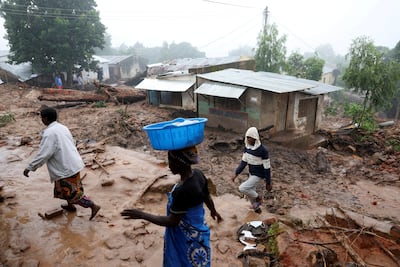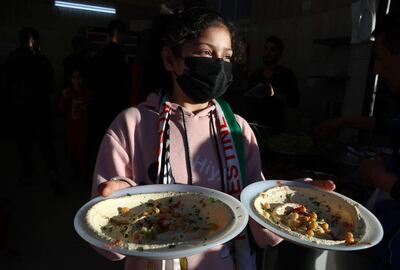UK donors give on average more than £130 million ($160 million) to charity during Ramadan, a charity has revealed.
These are only estimates, however, as some Muslims choose to send their zakat money abroad or give it to family, the Muslim Charities Forum said.
The National spoke to a number of British Muslims about their charitable efforts during Ramadan.
Charity begins at home
Londoner Alaa Hamdy sends her money to a UK charity that helps Muslims in the UK.
“The charity [I donate to] supports asylum seekers and those who need help the most in the UK,” she said.
“I find this more reassuring and quicker to send my zakat money to. I would like to be able to send money to other countries, too, soon, but for now, it’s going to those closer to home.”
Mariam Ibrahim, a digital creator from Stanford, said that it wasn’t only about money for her. She volunteers in a local scout group and teaches children about Ramadan.
“Muslims are a minority where I live. We create activities for the second and third generations who probably don’t know much about Islam,” she said.
“The activities are cultural and social, from games to group activities and camping. The idea is to teach them what they need to know about Islam, fasting, praying and other pillars of Islam.”
Ms Ibrahim also gives money to charity and helps raise cash for various causes each year.
This year, her focus is Malawi, where recent tropical storms left more than 200 dead and displaced hundreds of thousands.

Amr Zaki, a Londoner who is currently in Egypt, said life can be difficult for Muslims living in the UK.
“People in Egypt are very friendly and will support one another. Family and neighbours will always be there to help if they can,” he told The National. But life is different in the UK.
“Being alone abroad, with no family around, makes it harder to find that support and the benefits will never be sufficient.
“Life is very tough when you are abroad and I believe these people need help more than those surrounded by their families.”
The National Zakat Foundation, a charity that specialises in helping British Muslims, reports that the community has a history of giving to support those in need abroad.
However, Sohail Hanif, chief executive of NZF, said more UK Muslims are becoming aware of the increasing demand within their own communities, resulting in a rise in donations last year.
“The recent Muslim Census survey showed that a third of Muslims living in the UK have skipped meals and one in five have used a food bank in the past year,” he said.

“NZF receives an application for help every 40 minutes. In the last 30 days alone, we have received more than 5,000 applications for help, but have only been able to support just over 2,000.”
Despite this, there remains a lingering reluctance among some to ask for assistance, and NZF aims to promote the message that seeking help should not be a source of shame.
Sending zakat to homelands
Other British Muslims, mindful of the financial situations affecting their home countries, decide to send their zakat there.
Sarah Rafie, a London accountant, said that she prefers to send money home to Egypt. But rather than using charities and other organisations, she asks her family to find those who need help.
“I opened a bank account specifically for this reason. Throughout the year, I add money to the account. I sent the debit card to my mum back home and she can withdraw the money whenever she finds someone who needs help.

“We send it to the very poor. Families who are struggling to feed their children and those who can’t afford formula milk for infants with lactose intolerance.
“Medicine has also become very expensive back home, so I try to help anyone who needs it but can’t afford it.”
Mona Badr, a banker from Newcastle upon Tyne, said that she also prefers to send the money back home to Egypt and avoids giving her zakat to well-known charities.
“They are usually where people tend to send their money and I wanted to find others who are harder to reach,” she said.
“I send the money to my family, they will find those who really need it and sometimes I send them to hospitals to cover bills for those who can’t afford to pay them.”
When asked why she prefers to send her money abroad, Ms Badr said: “There are benefit systems in the UK to help those in need. Back home, there is no such thing. People are struggling and have nowhere to turn to. It’s my duty to help them.”
Mahmoud Eid, who is currently in Malawi, said he was spending his time and money helping those in dire need.
“I bought cement and some construction items and will help a family fix the roof over their head. The situation here is very bad and every penny will help,” he told The National.

Insaf, a retired journalist from London, told The National that she joins a family relief charity before Ramadan to help collect and prepare donations for those in Gaza and Syria.
Donations are not limited to money but also clothes and other household essentials such as blankets.
“They mainly collect clothes … used clothes from people that are in good condition. But we also collect money to help pay for essentials such as paying for hospital fees or buying medication,” she said.
“They help reach people who live in dire conditions. We helped pay for lunch meals for schoolchildren in Gaza for a week for as little as £50. We collect clothes for families who are struggling financially to afford it. I do what I can to help those who are worse off.”
Whether sending money abroad or closer to home, volunteering or writing a cheque, ultimately, the spirit of giving during the holy month is a testament to the importance of compassion and generosity in Islam.


